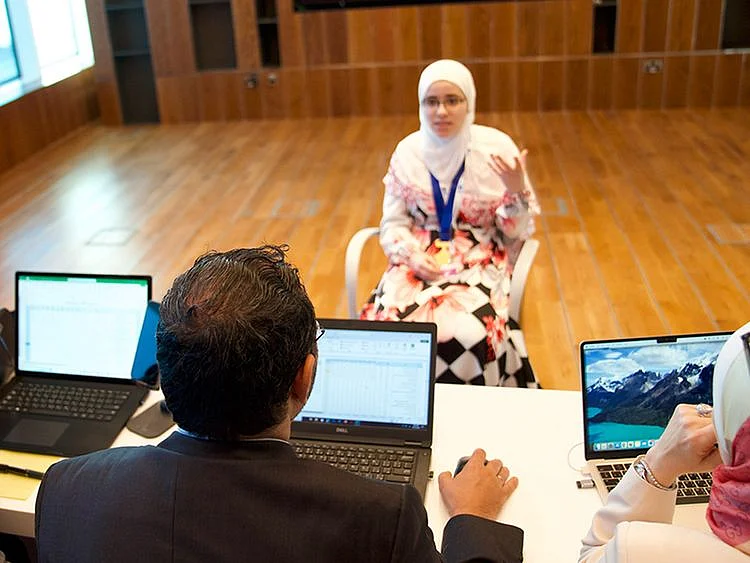23 non-Arabic speaking students eye Dh200,000 prize pool at 8th Arab Reading Challenge in Dubai
Final qualifying round for Community Champion title’s three winners gets underway in Dubai

Dubai: As many as 23 non-Arabic speaking students are eyeing cash prizes totalling Dh200,000 for the 8th Arab Reading Challenge’s ‘Community Champion’ title.
The final qualifying round for the title began in Dubai on Monday, with students competing at the Mohammed bin Rashid Library to determine the top three finalists who will advance to the concluding ceremony at Dubai Opera on October 23, where the winner will be announced.
Announced in the Challenge’s second edition and implemented in its third, the ‘Community Champion’ category allows students from Arab communities abroad, as well as non-Arabs learning Arabic, to participate. This addition marked a significant turning point for the world’s largest Arabic reading initiative.
The finals consist of an oral examination in which students will summarise the key themes of the 25 books they have read, demonstrating their command of Standard Arabic. The judging panel will evaluate each student’s comprehension and ability to articulate ideas in their own words. To succeed, students must confidently discuss, critique, and analyse the texts, demonstrating their ability to meaningfully connect the various concepts.
The winner of the Community Champion title will receive an award of Dh100,000 while the second and third place winners receive Dh70,000 and Dh30,000 respectively.
Community Champion finalists
The finalists in the ‘Community Champion’ category are: Yahya Khalid Al-Otaibi (Italy), Iyad Abdul Rahman Tabi (France), Suhaib Abdul Razzaq (Canada), Jana Al-Saeed Eid Al-Shal (Greece), Lana Esa’eed (Germany), Sara Musa (Denmark), Mohammed Abdul Fattah Al-Refaie (Sweden), Aya Walid Saad Al-Din (Norway), Jawhara Saleh Al-Hassan (Finland), Jihad Al-Jaffal (Belgium), Mohammed Hanan Pedaikail (India), Mazen Yousef Al Hussein (China), Radwa Abdullah (Australia), Razan Hawa (New Zealand), Zaid Aziz Ghanem (United Kingdom), Ahmed Abdul Raqib Ahmed (Malaysia), Dorinda Al Sayed Zaiter (Russia), Israa Musalli (Turkey), Lynn Al Majzoub (Austria), Ibrahim Afifi (Switzerland), Khadija Khalil Abdul Karim (Brazil), Kamee Basim Al-Jabai (Netherlands), and Mohammed Kalash (Ireland).
The 8th Arab Reading Challenge has attracted unprecedented participation, with over 28.2 million students from 50 countries representing 229,620 schools, and guided by 154,643 supervisors.
The winner of the Arab Reading Champion title receives a monetary award of Dh500,000, while the second and third place winners receive Dh100,000 and Dh70,000 respectively.
Protecting the Arabic language
Mohammad Al Gergawi, Secretary-General of the Mohammed bin Rashid Al Maktoum Global Initiatives (MBRGI), stated that over its eight editions, the Arab Reading Challenge has become a truly inspiring initiative with a tangible impact on Arab culture. It reflects the vision of His Highness Sheikh Mohammed bin Rashid Al Maktoum, Vice President and Prime Minister of the UAE and Ruler of Dubai, to empower the next generation through knowledge acquisition and mastery of the Arabic language. The Challenge provides a nurturing environment for creativity, enabling students to shape a brighter future.
Nurturing creative thinking
Launched in the academic year 2015-2016 under directives of Sheikh Mohammed, the Arab Reading Challenge aims to prepare a future generation who loves reading and knowledge, capable of expressing their identity in Arabic and are keen on learning and using this rich language in their day-to-day interactions. It also helps build a value system that encourages youth to learn about other cultures, which instills the principles of tolerance and coexistence, and opens the door for a global open dialogue.
Sign up for the Daily Briefing
Get the latest news and updates straight to your inbox
Network Links
GN StoreDownload our app
© Al Nisr Publishing LLC 2026. All rights reserved.